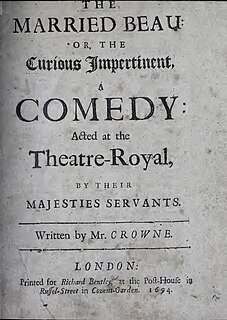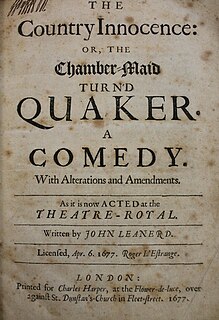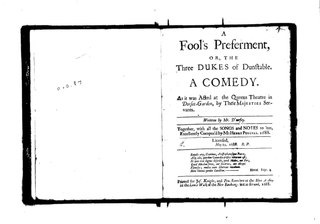
Epsom Wells is a 1672 restoration comedy by the English writer Thomas Shadwell. It was the first in a line of plays set in spa towns. The incidental music was composed by Nicholas Staggins. In the 1690s Henry Purcell scored a new staging of the play. It was performed at the Dorset Garden Theatre by the Duke's Company. The cast included Henry Harris as Rains, Thomas Betterton as Bevil, William Smith as Woodly, Cave Underhill as Justice Clodpate, Anne Gibbs as Lucia, Mary Betterton as Mrs Jilt, James Nokes as Bisket and Edward Angel as Fribble.

The Married Beau or The Curious Impertinent is a 1694 comedy play by the English writer John Crowne. It is inspired by a passage from Miguel de Cervantes's Don Quixote. Incidental music was composed by Henry Purcell.
Squire Oldsapp is a 1678 comedy play by the English writer Thomas D'Urfey. Staged by the Duke's Company at the Dorset Garden Theatre in London, the original cast included Thomas Betterton as Welfore, William Smith as Henry, John Crosby as Lovell, James Nokes as Squire Oldsapp, Anthony Leigh as Sir Frederick Banter, Samuel Sandford as Colonel Buff, Cave Underhill as Pimpo, Emily Price as Christina and Elizabeth Currer as Madame Tricklove.
The Country Wit is a 1676 comedy play by the English writer John Crowne, part of the tradition of Restoration Comedy. It was first staged at the Dorset Garden Theatre in London by the Duke's Company. The cast included Samuel Sandford as Sir Thomas Rash, Thomas Betterton as Ramble, James Nokes as Sir Mannerly Shallow, Henry Harris as Merry, Cave Underhill as Booby, Matthew Medbourne as Lord Drybone, Anthony Leigh as Rash, Mary Betterton as Lady Faddle, Mary Lee as Christina, Elizabeth Currer as Betty Frisque and Elinor Leigh as Isabella.
The London Cuckolds is a 1681 comedy play by the English writer Edward Ravenscroft.
Margaret Osborne or Osborn was an English stage actor of the seventeenth century. She was a long-standing member of the Duke's Company from 1671, acting at Lincoln's Inn Fields and the Dorset Garden Theatre. She went to Dublin to work at the Smock Alley Theatre in 1677, but returned to the Duke's Company around two years later She subsequently joined the merged United Company in 1682 and was still acting in the 1690s.
Sir Anthony Love; Or, The Rambling Lady is a 1690 comedy play by the Irish writer Thomas Southerne. It was originally staged by the United Company at the Theatre Royal, Drury Lane with a cast that included Susanna Mountfort in a breeches role as Sir Anthony Love, William Mountfort as Valentine, Joseph Williams as Ilford, William Bowen as Sir Gentle Golding, Anthony Leigh as An Abbe, John Hodgson as Count Canaile, Samuel Sandford as Count Verole, George Bright as Waitwell, Colley Cibber as Servant to Sir Gentle, Charlotte Butler as Floriante, Anne Bracegirdle as Charlote and Frances Maria Knight as Volante. The play's incidental music was composed by Henry Purcell.

A Fond Husband; Or, The Plotting Sisters also known as The Fond Husband is a 1677 comedy play by the English writer Thomas D'Urfey. It was first staged by the Duke's Company at London's Dorset Garden Theatre with a cast that included William Smith as Rashley, Henry Harris as Ranger, James Nokes as Peregrine Bubble, Anthony Leigh as Old Fumble, Samuel Sandford as Sir Roger Petulant, Thomas Jevon as Sneak, John Richards as Spatterdash, Thomas Percival as Apothecary, Elizabeth Barry as Emillia, Rebecca Marshall as Maria and Margaret Hughes as Cordelia. The published version was dedicated to the Irish statesman James Butler, Duke of Ormonde.

The Comical Revenge; Or, Love In A Tub is a 1664 comedy play by the English writer George Etherege. First staged by the Duke's Company, it premiered at the Lincoln's Inn Fields Theatre. It is one of the earliest Restoration Comedies.
John Crosby was an English stage actor of the Restoration Period. He first recorded performance is in 1662 when he appeared in Ignoramus at Whitehall Palace, likely as a child actor. It was further eight years before he was solidly established in the Duke's Company in 1670 beginning with The Forc'd Marriage by Aphra Behn. He became a regular with the company over the following decade, often playing young lover roles. He retired from the stage in 1679 and later became a justice of the peace for Middlesex. He died on 8 April 1724 and was buried in St Sepulchre.

She Would If She Could is a 1668 comedy play by the English writer George Etherege. It was originally staged at the Lincoln's Inn Fields Theatre by the Duke's Company.
The Woman Captain; Or, The Usurer Turned Soldier is a 1679 comedy by the English writer Thomas Shadwell. It was originally staged by the Duke's Company at Dorset Garden Theatre in London. The original cast is unknown except for Elizabeth Barry who played the title role, and also read the epilogue. It is part of the tradition of Restoration Comedy that flourished during the era.

The Empress of Morocco is a 1673 tragedy by the English writer Elkanah Settle. It was originally staged by the Duke's Company at the Dorset Garden Theatre in London. The cast included Henry Harris as Muly Labas, William Smith as Muly Hamet, Thomas Betterton as Grimalhaz, Matthew Medbourne as Hametalhaz, John Crosby as Abdelcador, Mary Betterton as Laula and Mary Lee as Mariamne. The published version was dedicated to Henry Howard, Earl of Norwich.

Theodosius; Or, The Force Of Love is a 1680 tragedy by the English writer Nathaniel Lee. It was first staged by the Duke's Company at the Dorset Garden Theatre. It takes place during the reign of the Roman Emperor Theodosius II. Incidental music for the play was composed by Henry Purcell.

Love Triumphant; Or, Nature Will Prevail is a 1694 tragicomedy by the English writer John Dryden. It was Dryden's final stage play.

Sir Barnaby Whigg; Or, No Wit Like A Womans is a 1681 comedy play by the English writer Thomas D'Urfey. It was first staged by the King's Company at the Theatre Royal, Drury Lane. A song for the play was composed by Henry Purcell.

The Country Innocence; Or, The Chamber-maid Turn'd Quaker is a 1677 comedy play by the English writer John Leanerd. It was originally performed by the King's Company at the Theatre Royal, Drury Lane in London. It borrowed very heavily from the 1647 work The Countrie Girl by Thomas Brewer.

A Fool's Preferment; Or, The Three Dukes Of Dunstable is a 1688 comedy play by the English writer Thomas D'Urfey. It is a reworking of John Fletcher's Jacobean work The Noble Gentleman. It was first performed by the United Company at the Dorset Garden Theatre in London. Henry Purcell composed the play's incidental music. It was his first major work composingfor the theatre in seven years since Sir Barnaby Whigg.

Troilus And Cressida; Or, Truth Found Too Late is a 1679 tragedy by the English writer John Dryden. It was first staged by the Duke's Company at the Dorset Garden Theatre in London. It was a reworking of William Shakespeare's 1602 play Troilus and Cressida, set during the Trojan Wars. In acknowledgement of this Dryden has the prologue spoken by Shakespeare's ghost, defending the alterations made to the play.

Sir Salomon; Or, The Cautious Coxcomb is a 1670 comedy play by the English writer John Caryll. It has often been staged under the title Sir Solomon Single. It was first performed by the Duke's Company at the Lincoln's Inn Fields Theatre in London. It is part of the tradition of Restoration comedy.













